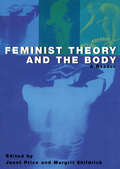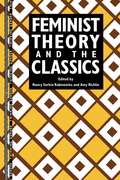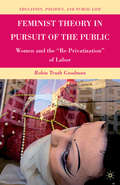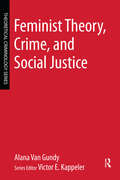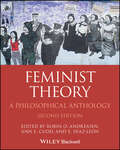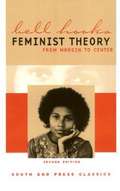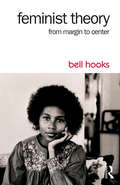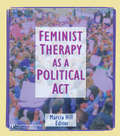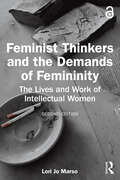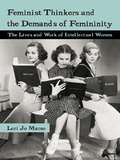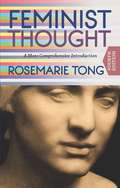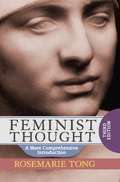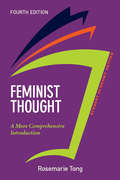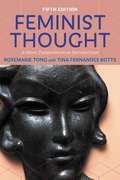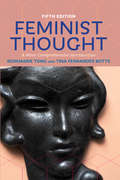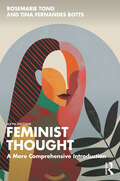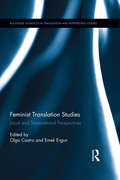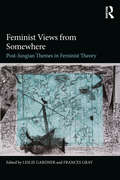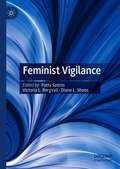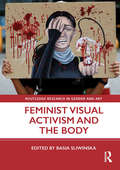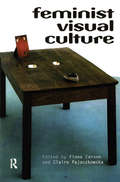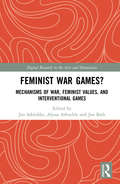- Table View
- List View
Feminist Theory and the Body: A Reader
by Janet Price Margrit ShildrickFirst published in 1999. Routledge is an imprint of Taylor & Francis, an informa company.
Feminist Theory and the Classics (Thinking Gender)
by Nancy Sorkin Rabinowitz Amy RichlinFirst published in 1993. Routledge is an imprint of Taylor & Francis, an informa company.
Feminist Theory in Pursuit of the Public
by Robin Truth GoodmanArgues that feminism needs to develop a theory of the public responding to a moment when feminism's impetus to reconstitute the private sphere left a huge gap in its political thinking on the public.
Feminist Theory, Crime, and Social Justice
by Alana Van GundyFeminist Theory, Crime, and Social Justice offers an insightful look at the primarily masculine-driven perspective on crime and justice through the lens of feminist theory. The book presents the argument that an increased understanding of the female crime typology, life course, and gender-specific programming will improve social justice for offenders. Discussions on the direct implications of the way society views crime and justice contribute to policy recommendations for helping to improve these views, specifically as they relate to female crime.
Feminist Theory: A Philosophical Anthology (Blackwell Philosophy Anthologies)
by Ann E. Cudd Robin O. Andreasen E. Díaz‐LeónBringing together influential voices and groundbreaking new essays, Feminist Theory: A Philosophical Anthology examines the key questions at the heart of feminist philosophy through a clear structure and accessible yet rigorous content. This carefully curated selection of classic and contemporary essays emphasizes the flourishing growth of feminist thought over time, ranging from foundational texts by Simone de Beauvoir, Judith Butler, and Kimberlé Crenshaw, to new essays by contemporary scholars like Kate Manne, Talia Mae Bettcher, and Robin Dembroff. This edition expands on the original with fresh scholarship and a broader range of perspectives on gender, identity, knowledge, production and justice. New essays address intersectionality, gender identity, the critique of ideal theory, feminist critiques of traditional ethics, the impact of social norms on autonomy and epistemic injustice, and much more. Including critiques of traditional philosophical frameworks and self-reflection of feminism itself, this essential collection highlights how feminist theory shapes and challenges our current understanding of society. Designed for students and scholars in philosophy, gender studies, and social theory, Feminist Theory: A Philosophical Anthology is ideal for students taking courses in feminist philosophy and feminist theory, educators in social sciences and humanities, and activists and professionals seeking a nuanced understanding of feminist philosophy.
Feminist Theory: From Margin to Center
by Bell HooksOne of the major differences Bell Hooks see in the political climate today is that there is less collective support for coming to critical consciousness--in communities, in institutions, and among friends.
Feminist Theory: From Margin to Center (South End Press Classics Ser. #No. 5)
by Bell HooksWhen Feminist Theory: From Margin to Center was first published in 1984, it was welcomed and praised by feminist thinkers who wanted a new vision. Even so, individual readers frequently found the theory "unsettling" or "provocative." Today, the blueprint for feminist movement presented in the book remains as provocative and relevant as ever. Written in hooks's characteristic direct style, Feminist Theory embodies the hope that feminists can find a common language to spread the word and create a mass, global feminist movement.
Feminist Therapy
by Laura S. BrownIn this second edition of her popular book, Laura S. Brown reviews the history, theory, empirical basis, and practice of feminist therapy, a groundbreaking approach that not only listens to, but privileges, the voices and experiences of those who have been defined as "other" by dominant cultures. Feminist therapy has evolved significantly from its early days. Originally it functioned primarily as a corrective against the sexist approaches of the era, whereas now it has become a sophisticated, postmodern, technically integrative model of practice that uses the analysis of gender, social location, and power as a primary strategy for comprehending human difficulties. Feminist therapy is no longer just for women—it has grown to encompass work with women, men, children, families, and larger systems. New to this edition is an updated discussion of the sociopolitical environment for women and other marginalized groups, updated research, and more inclusive terminology and discussion of transgender and nonbinary individuals.
Feminist Therapy as a Political Act
by Marcia HillFeminist Therapy as a Political Act explores what is means to politicize therapy and how you can make pyschotherapy a method for creating social and individual change. You’ll find examples and strategies for discussing topics such as empowerment and identity that allow you to provide better services to clients while learning new ideas and methods of feminist therapy. Examining how language, behavior, and political thinking influence therapeutic methods, Feminist Therapy as a Political Act contains suggestions and examples that can be applied to clients in the individual, hospital, or community setting. You’ll discover the rich variety of ways in which therapists politicize the therapy relationship, setting, assumptions, techniques, and dialogues, and find several examples on how to incorporate political consciousness into your sessions. Feminist Therapy as a Political Act gives you insight into several methods and practices, including: integrating specific therapy techniques and the background dialogue of therapy into principles of feminist therapy practices modifying cognitive-behavioral therapy, hypnosis, and other therapy techniques to make them more compatible with feminist principles redefining and reclaiming empowerment for conducting political analysis in feminist psychotherapy recognizing client identity, including race, gender, and sexual identity, to provide clients with better therapy providing information on Japanese feminist counseling in relation to Eastern thought, the women’s liberation movement, and the concepts of independence, dependence, and maternity discussing the challenges of working with menContributors to Feminist Therapy as a Political Act give you insight into the profession on the international level, for example, examining the challenges to feminist therapists in Japan and describing how survivors of incest and sexual abuse in Israel “went public” with their ordeals through art, poetry, performances, and lectures. Offering diverse methods, techniques, and suggestions that will help you provide better services for your clients, Feminist Therapy as a Political Act also gives you the knowledge and inspiration to make your therapeutic work a political act.
Feminist Thinkers and the Demands of Femininity: The Lives and Work of Intellectual Women
by Lori Jo MarsoExamining the lives and work of feminist thinkers throughout history, this book explores their struggles with politics, intellectual work, and material and existential conditions of femininity. A new introduction to this second edition resituates these themes in contemporary feminist literature and theory.Feminist autobiographical accounts exploring multiple lives and loves, encounters with political comrades and enemies, and frustrations with social expectations about feminine respectability, offer tastes of feminist lives across history and situation. But the stories are not always inspirational or exemplary. How do feminists survive and thrive in situations marked by intersecting harms of sexism, racism, and colonial and capitalist extraction? Thinking beyond representation and empathy as ways to connect, this book features disorienting and disruptive examples from feminist experiments in living and explores the uncomfortable feelings they invite in readers. Insisting that feminists should read the autobiographies and memoirs of feminist actors alongside their theoretical contributions, the volume features the work of Simone de Beauvoir, Emma Goldman, Ida B. Wells, Audre Lorde, Azar Nafisi, Ana Castillo, Carolyn Kay Steedman, Germaine de Staël, Mary Wollstonecraft, and more.Written for students and scholars of Women’s History, and everyone who “feels like a feminist,” this book embodies and electrifies the feminist insight that the personal is political.
Feminist Thinkers and the Demands of Femininity: The Lives and Work of Intellectual Women
by Lori MarsoExamining the lives and work of historical and contemporary feminist intellectuals, Feminist Thinkers and the Demands of Femininity explores the feminist struggle to "have it all." This fascinating interdisciplinary study focuses on how feminist thinkers throughout history have long striven to balance politics, intellectual work, and the material conditions of femininity. Taking a close look at this quest for an integrated life in the autobiographical and theoretical writings of well-known feminists such as Mary Wollstonecraft, Emma Goldman, and Simone de Beauvoir, alongside contemporary counterparts, like Azar Nafisi, Audre Lorde, and Ana Castillo, Marso moves beyond questions of who women are and what women want, adding an innovative personal dimension to feminist theory, showing how changing conceptions of femininity manifest themselves within all women’s lives.
Feminist Thought
by Rosemarie Putnam TongFeminist Thought offers a clear, comprehensive, and incisive introduction to the major traditions of feminist theory, from liberal feminism, radical feminism, and Marxist and socialist feminism to care-focused feminism, psychoanalytic feminism, and ecofeminism. The fourth edition has been thoroughly revised and expanded, including a new section on existentialism as it relates to postmodern feminism in Chapter 5, and a new conclusion that contemplates third-wave feminism and the future directions of feminist theory. Chapter 6 on women of color feminisms was also significantly revised and expanded by Tina Fernandes of the University of North Carolina at Charlotte. Learning tools like the new end-of-chapter discussion questions, and the bibliography, organized by topics within chapters, make Feminist Thought an essential resource for students and thinkers who want to understand the theoretical origins and complexities of contemporary feminist debates.
Feminist Thought
by Rosemarie TongA clear, comprehensive, and indispensable introduction to the major traditions of feminist theory, Feminist Thought includes incisive, critical examinations of liberal feminism, radical feminism, Marxist and socialist feminism, and ecofeminism.<P><P> This third edition has been thoroughly reformulated and expanded to include the latest developments in feminist thought, including a new chapter on care-focused feminism (Chapter 5), an exploration of the connections of multicultural and global feminism with postcolonial feminism (Chapter 6), and a close consideration of the links between postmodern feminism and third-wave feminism (Chapter 8). Key feminist theorists such as Judith Butler, Martha Nussbaum, and Eva Feder Kittay receive new or extended discussions. The bibliography, organized by topics within chapters, provides an invaluable aid to further research. An illuminating guide to the diversity of feminism, Feminist Thought continues to serve as the essential resource for students and thinkers who want to understand the theoretical origins and complexities of contemporary feminist debates. Contents Introduction; The Diversity of Feminist Thinking 1. Liberal Feminism 2. Radical Feminism; Libertarian and Cultural Perspectives 3. Marxist and Socialist Feminism; Classical and Contemporary 4. Psychoanalytic Feminism 5. Care-focused Feminism 6. Multicultural, Global, and Postcolonial Feminism 7. Ecofeminism 8. Postmodern and Third-wave Feminism Conclusion; Margins and Centers This edition is in two volumes. The first volume ISBN is 9781458781574.
Feminist Thought
by Rosemarie Tong"Feminist Thought "is a clear, comprehensive, and incisive introduction to the major traditions of feminist theory, from liberal feminism, radical feminism, and Marxist and socialist feminism to care-focused feminism, psychoanalytic feminism, women of color feminisms, and ecofeminism. The fourth edition has been thoroughly revised and expanded. The chapter on multiculturalism was renamed Women of Color Feminisms and significantly updated, revised, and expanded by Tina Fernandes Botts of the University of North Carolina, Charlotte. The revisions also include a new section on existentialism as it relates to postmodern feminism, and a new conclusion that contemplates third-wave feminism and the future directions of feminist theory. Learning tools such as the new end-of-chapter discussion questions, and the bibliography, organized by topics within chapters, make "Feminist Thought "an essential resource for students and thinkers who want to understand the theoretical origins and complexities of contemporary feminist debates.
Feminist Thought, Student Economy Edition: A More Comprehensive Introduction
by Rosemarie TongA critical introduction to the major traditions of feminist theory, now with new considerations of existential feminism and a conclusion reflecting on the future of feminist theory.
Feminist Thought: A More Comprehensive Introduction
by Rosemarie Tong Tina Fernandes BottsA classic resource on feminist theory, Feminist Thought offers a clear, comprehensive, and incisive introduction to the major traditions of feminist theory, from liberal feminism, radical feminism, and Marxist and socialist feminism to care-focused feminism, psychoanalytic feminism, and ecofeminism. The fifth edition has been thoroughly revised, and now includes a new chapter on Third Wave and Third Space Feminism. Also added to this edition are significantly expanded discussions on women of color feminisms, psychoanalytic and care feminisms, as well as new examinations of queer theory, LGBTQ and trans feminism.Learning tools like end-of-chapter discussion questions and the bibliography make Feminist Thought an essential resource for students and thinkers who want to understand the theoretical origins and complexities of contemporary feminist debates.
Feminist Thought: A More Comprehensive Introduction
by Rosemarie TongA classic resource on feminist theory, Feminist Thought offers a clear, comprehensive, and incisive introduction to the major traditions of feminist theory, from liberal feminism, radical feminism, and Marxist and socialist feminism to care-focused feminism, psychoanalytic feminism, and ecofeminism. The fifth edition has been thoroughly revised, and now includes a new chapter on Third Wave and Third Space Feminism. Also added to this edition are significantly expanded discussions on women of color feminisms, psychoanalytic and care feminisms, as well as new examinations of queer theory, LGBTQ and trans feminism.Learning tools like end-of-chapter discussion questions and the bibliography make Feminist Thought an essential resource for students and thinkers who want to understand the theoretical origins and complexities of contemporary feminist debates.
Feminist Thought: A More Comprehensive Introduction
by Rosemarie Tong Tina Fernandes BottsA classic resource on feminist theory, this updated sixth edition of Feminist Thought: A More Comprehensive Introduction offers a clear, comprehensive, and incisive introduction to the major traditions of feminist theory.This new edition explores in detail the wide spectrum of feminist thought, from liberal feminism, radical feminism, Marxist and socialist feminisms, women-of-color feminisms, global, postcolonial, and transnational feminisms, to psychoanalytic feminism, care-focused and maternal-focused feminisms, to ecofeminism, existentialist, poststructural, and postmodern feminisms. The book also includes an expanded discussion of third-wave, fourth-wave, and fifth-wave feminisms, plus much new material on intersectionality, LGBTQ+ issues, gender identities, sexual orientations, and queer theory.Learning tools like end-of-chapter discussion questions and an enhanced, up-to-date bibliography make Feminist Thought an essential resource for students and thinkers who want to understand the theoretical origins and complexities of contemporary feminist debates.
Feminist Translation Studies: Local and Transnational Perspectives (Routledge Advances in Translation and Interpreting Studies)
by Olga Castro Emek ErgunFeminist Translation Studies: Local and Transnational Perspectives situates feminist translation as political activism. Chapters highlight the multiple agendas and visions of feminist translation and the different political voices and cultural heritages through which it speaks across times and places, addressing the question of how both literary and nonliterary discourses migrate and contribute to local and transnational processes of feminist knowledge building and political activism. This collection does not pursue a narrow, fixed definition of feminism that is based solely on (Eurocentric or West-centric) gender politics—rather, Feminist Translation Studies: Local and Transnational Perspectives seeks to expand our understanding of feminist action not only to include feminist translation as resistance against multiple forms of domination, but also to rethink feminist translation through feminist theories and practices developed in different geohistorical and disciplinary contexts. In so doing, the collection expands the geopolitical, sociocultural and historical scope of the field from different disciplinary perspectives, pointing towards a more transnational, interdisciplinary and overtly political conceptualization of translation studies.
Feminist Views from Somewhere: Post-Jungian themes in feminist theory
by Frances Gray Leslie GardnerFeminist Views from Somewhere: Post-Jungian Themes in Feminist Theory explores what and how Jungian thought contributes to feminist thinking. Broadly speaking, feminist thinking, or thinking by and about women as autonomous, intelligent and independent agents, has opened up scholarship through insightful, reflective critique and practice. This is the starting point of this collection from a range of theorists, interested in the multiple concerns of Jungian and analytical psychology. The contributors take a unique approach to Jungian thinking. Rather than focusing on its mythological aspects, the authors develop alternative, feminist approaches that enhance the appreciation of the possibilities for Jungian and post-Jungian studies. With a primarily theoretical orientation, the rigorous, critical approaches in the collection highlight the possibilities of imaginative Jungian theory. Divided into three parts, ‘Viewing Earth’, ‘Clinical Perspectives’ and ‘Literary Landscapes’, the chapters cover themes including embodiment, intersubjectivity, individuation and narrative. The contributors vividly reflect the range and diversity of opinions amongst women influenced by Jungian thought. Feminist Views from Somewhere is essential reading for academics and students of Jungian and post-Jungian studies, women’s studies and gender studies, as well as analytical psychologists in practice and in training.
Feminist Vigilance
by Diane L. Shoos Patty Sotirin Victoria L. BergvallThis collection advances vigilance as a critical feminist concept and strategy for addressing contemporary challenges. The assembled chapters develop feminist vigilance by elaborating concrete examples that emphasize action, ethics, and hope. Chapter authors expand on current feminist discussions about such issues as Black women’s self-care and anticipatory vigilance; media portrayals of race, gender, and violence; religion and social justice; technofeminist activism; postcolonial feminist critique; research ethics; and collective civic action. The contributions engage with larger discussions of social precarity, public anxiety, post-feminist appeals, and future feminist trajectories. Particular benefits of the collection include relatable content based in contemporary experiences, insightful and pragmatic conceptions of vigilance from feminist perspectives, and critical engagement with issues of intersectionality, agency, embodiment, and care ethics. The collection aims to address the need for productive academic responses to contemporary challenges to gendered identities, feminism, and intersectional relations that avoid abstractions or overwhelmingly negative analyses. Instead, this collection invites readers to engage in feminist vigilance as a fresh perspective, commitment, and strategy.
Feminist Visual Activism and the Body (Routledge Research in Gender and Art)
by Basia SliwinskaThis book examines contemporary feminist visual activism(s) through the lens of embodiment(s). The contributors explore how the arts articulate and engage with the current sense of crisis and political concerns (e.g. equality, decolonisation, social justice, democracy, precarity, vulnerability), negotiated with and through the body. Drawing upon the legacy of feminist art historical critique, the book scrutinises activist strategies, practices and resilience techniques in intersectional and transnational frameworks. It interrogates how the arts enable the creation of civil and political resilience, become engaged with politics as a response to disaster capitalism and attempt to reform and improve society. The book will be of interest to scholars working in art history, visual culture, fine arts, women’s studies, gender studies, feminism and cultural studies.
Feminist Visual Culture
by Fiona Carson Claire PajaczkowskaFirst Published in 2001. Routledge is an imprint of Taylor & Francis, an informa company.
Feminist War Games?: Mechanisms of War, Feminist Values, and Interventional Games (Digital Research in the Arts and Humanities)
by Jon Saklofske Alyssa Arbuckle Jon BathFeminist War Games? explores the critical intersections and collisions between feminist values and perceptions of war, by asking whether feminist values can be asserted as interventional approaches to the design, play, and analysis of games that focus on armed conflict and economies of violence. Focusing on the ways that games, both digital and table-top, can function as narratives, arguments, methods, and instruments of research, the volume demonstrates the impact of computing technologies on our perceptions, ideologies, and actions. Exploring the compatibility between feminist values and systems of war through games is a unique way to pose destabilizing questions, solutions, and approaches; to prototype alternative narratives; and to challenge current idealizations and assumptions. Positing that feminist values can be asserted as a critical method of design, as an ideological design influence, and as a lens that determines how designers and players interact with and within arenas of war, the book addresses the persistence and brutality of war and issues surrounding violence in games, whilst also considering the place and purpose of video games in our cultural moment. Feminist War Games? is a timely volume that questions the often-toxic nature of online and gaming cultures. As such, the book will appeal to a broad variety of disciplinary interests, including sociology, education, psychology, literature, history, politics, game studies, digital humanities, media and cultural studies, and gender studies, as well as those interested in playing, or designing, socially engaged games.
